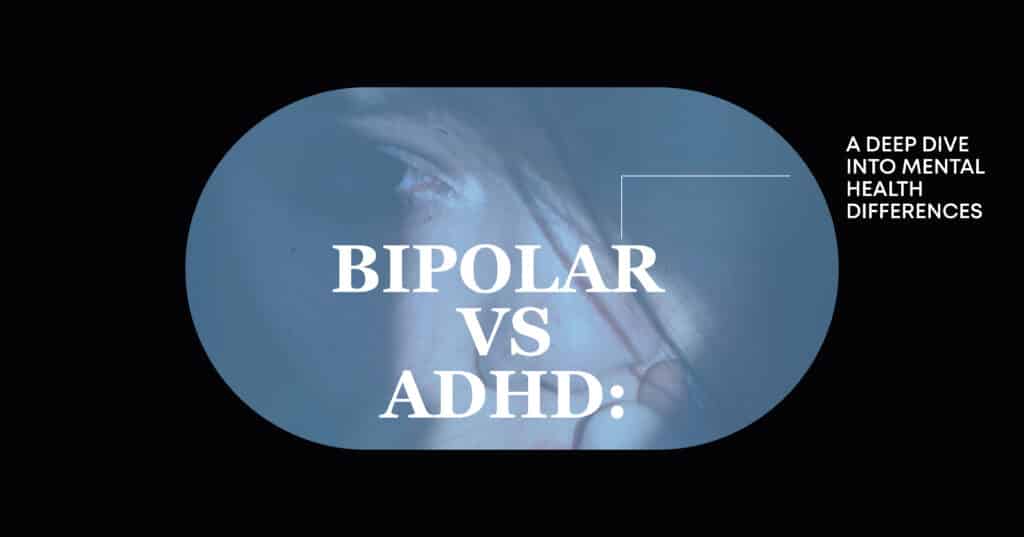Bipolar disorder and attention-deficit/hyperactivity disorder (ADHD) are among the most common mental health issues people have to deal with worldwide. But how can someone know what kind of disorder they have? And are there efficient ways to alleviate the symptoms that impact your life in a negative way?
In this guide we will take a closer look at manifestations of bipolar disorder and ADHD, explore the differences in the diagnostic process, and learn more about the treatment options patients have nowadays.
Understanding Bipolar Disorder and ADHD
Bipolar disorder is a mental health condition characterized by severe mood fluctuations, inability to focus, and energy levels. ADHD refers to a neurodevelopmental disorder whose main manifestations are hyperactivity, impulsivity, and lack of concentration. Both of these disorders can impact your life in a negative way although the severity varies from person to person. Besides, ADHD will change the way you pay attention and behave while bipolar disorder will mostly affect your mood.
Key Characteristics of Bipolar Disorder
While only a qualified mental health professional can tell you what kind of diagnosis you might have, you can distinguish bipolar disorder from similar mental health conditions based on a few symptoms:
- Intense mood swings. You are going from a hypomanic episode to a depressive one.
- Mania. Your thoughts are racing, your energy levels are increased, and you do not need sleep to feel fresh.
- Hypomania. This manifestation is less severe than mania – it will not disrupt your daily functioning.
- Psychotic symptoms. These are quite rare but some people will experience delusions and hallucinations during an episode.
Comparing Bipolar vs ADHD Symptoms
A person without mental health training may struggle to distinguish the symptoms of bipolar disorder from ADHD manifestations yet these conditions are rather different:
- ADHD means struggling with hyperactivity and short attention span while bipolar disorder will manifest in mood shifts, elevated mood, and depression.
- The symptoms of ADHD will be present throughout life while the manic and hypomanic episodes typical for bipolar disorder may last for weeks and months.
- ADHD is often diagnosed in childhood while bipolar disorder becomes evident when the person is a teenager or a young adult.
Mood Swings in Bipolar Disorder Vs Impulsivity in ADHD
It may be difficult to differentiate between mood fluctuations and chronic impulsivity yet these symptoms are not the same. Mood swings refer to random and intense changes in your emotional state, and impulsivity is the urge to act without thinking about the harmful consequences of an action in question. Quite often, individuals with ADHD experience mood swings but they are usually triggered by external stressors rather than yet another mental health diagnosis. Similarly, lack of impulse control may occur during a manic or hypomanic episode but it is not one of the key traits of bipolar disorder.
Attention Deficit and Hyperactivity Challenges
ADHD is characterized by impulsivity, hyperactivity, and inability to focus which leads to all sorts of problems for a person before they are diagnosed and after they get a diagnosis but cannot access the care they need:
| Negative Impact of ADHD | Description |
| Emotional | Mood fluctuations, constant frustration, intense emotions, and emotional dysregulation are common consequences of poorly managed ADHD |
| Social | A person with this disorder might struggle to interpret social cues, maintain a conversation, and participate effectively in a group setting which often causes rejection and isolation |
| Academic | Students of all ages may experience difficulties – they make careless errors, cannot complete tasks and assignments, and interrupt others which creates a hostile learning environment |
| Professional | Your focus and organizational skills will be impaired by ADHD – it is much harder for an individual diagnosed with this condition to meet deadlines, manage several projects, and prioritize tasks |
Mental Health and Diagnosis Differences
Bipolar vs ADHD: will a medical provider know the right diagnosis? An experienced mental health professional – whether you decide to speak to a therapist or psychiatrist first – will spot the symptoms of ADHD and bipolar disorder without mixing these two conditions and prescribing incorrect treatment. Besides, ADHD is typically diagnosed in childhood before the person is even a teenager while bipolar disorder emerges when the individual is in late adolescence or early adulthood which makes the diagnostic process easier.

Importance of Accurate Diagnosis
Do not underestimate the significance of a definitive diagnosis when it comes to ADHD and bipolar disorder. Unfortunately, misdiagnosis might result in ineffective treatment strategies as well as potentially harmful interventions – for instance, stimulants often prescribed to individuals with ADHD may worsen or trigger manic episodes in bipolar people. Considering the fact that many people with ADHD are also diagnosed with bipolar disorder, learning your diagnosis as early as possible will give you clarity and peace of mind on top of timely treatment options.
Treatment Approaches for Bipolar Disorder and ADHD
Most mental health professionals agree that patients can improve their health outcomes if they commit to regular therapy, take medication to deal with the most severe symptoms, and make meaningful changes to their lifestyles:
| Bipolar Disorder | ADHD | |
| Therapy | Cognitive behavioral therapy will help you reappraise your painful thoughts and replace the negativity with positive ideas and affirmations while dialectical behavior therapy will teach you how to cope with intense emotions and tolerate stress in a healthier way | Mindfulness-based therapy is a perfect choice for individuals with ADHD – it helps them reduce struggle and suffering and improve focus instead of spending time on actions that consume their energy and time. Social skills training is also beneficial especially for people who need to learn social cues and communicate more effectively |
| Medication | In most instances, a combination of atypical antipsychotics and mood stabilizers can ensure the manifestations of bipolar disorder do not disrupt the person’s life | Short-acting and long-acting stimulants such as Focalin, Ritalin, and Concerta are often used to adjust the levels of neurotransmitters in the patient’s brain |
| Better Lifestyle Choices | Prioritize sleep, establish a consistent daily routine, and engage in regular physical activity to stabilize your mood and manage stress | Take a mental step back to observe your emotions and feelings with stress management and relaxation techniques, pay attention to proper nutrition, and avoid caffeine and alcohol to improve your functioning |
Connect With Hillside Horizon for Teens for Mental Health Support
Whether you suspect you may have ADHD or bipolar disorder or you think your current treatment strategy is not the most adequate, talking to a qualified mental health specialist and learning their opinion is a smart solution.
At Hillside Horizon for Teens, we offer a variety of therapeutic options that bipolar individuals and people with ADHD can utilize to improve their quality of life – contact us now to address your concerns promptly and protect your mental health in the long run.

FAQs
What are the key differences in bipolar disorder symptoms and ADHD symptoms?
Bipolar disorder affects your mood while ADHD changes the way you pay attention to tasks and responsibilities and behave in situations that make you feel stressed and overwhelmed. Bipolar disorder is often exacerbated by environmental triggers, and the symptoms of ADHD usually develop without external influence.
How do mood swings in bipolar disorder differ from the emotional instability seen in ADHD?
Moodiness and emotional dysregulation are quite common for individuals with either of these conditions. Emotional instability caused by ADHD is more frequent and less severe than prolonged mood fluctuations that occur during a manic, hypomanic, or depressive episode a bipolar person experiences.
Can attention deficit in ADHD be mistaken for symptoms of bipolar disorder?
A therapist or psychiatrist may confuse these conditions if they lack experience or a patient does not provide them with an honest and complete description of their symptoms and the factors that may have caused them.
What role do impulsivity and hyperactivity play in the diagnosis differences between bipolar disorder and ADHD?
The persistent patterns of hyperactitvity and impulsivity are much more evident when ADHD is the right diagnosis. A bipolar individual may exhibit these symptoms but their mood will shift when a manic or hypomanic episode is over.
How does an accurate diagnosis impact mental health treatment plans for individuals with bipolar disorder or ADHD?
You need to know your diagnosis after a thorough evaluation so that you and your therapist or psychiatrist are able to pick the most effective therapy modality and type of medication to target a particular symptom – certain types of therapy may be useless to a patient, and stimulant medications prescribed in the event of ADHD can harm a bipolar person.




